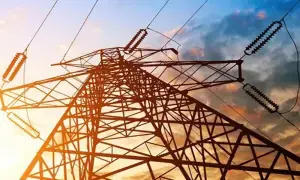Government to bring new mechanism to reduce power rates
4 min readThe government has decided to implement a blended gas pricing mechanism by eliminating the ring-fenced Liquefied Natural Gas (LNG) pricing and integrating it with wellhead and pipeline quality natural gases.
Minister for Petroleum Dr. Musadik Malik shared this information with journalists. He noted that the government is close to finalizing an investment deal for the Reko Diq project and will soon decide to establish a greenfield refinery valued at over $10 billion to produce petroleum products and petrochemicals on a 50:50 basis.
According to a report in Dawn, the minister claimed he was unaware of the high-speed diesel crisis that has nearly shut down the country’s refineries and led Pakistan State Oil (PSO) to cancel import orders under long-term contracts. This was due to special import orders being issued to a specific market player, resulting in a loss of foreign exchange for the nation.
Dr. Malik assured that he would look into the issue and provide updates to the media soon.
The minister noted that gaps in the regulations governing LNG imports and its restricted supply and pricing to the power sector have caused numerous issues. He stated that while four LNG-based power projects are efficient, they have remained idle for extended periods due to the ring-fenced LNG pricing.
Malik stated that the wellhead gas price is approximately Rs 570-580 per unit, while pipeline quality gas costs around Rs 1,600 per unit and LNG is priced at about Rs 3,500 per unit.
The average price for a blend of these three sources would be around Rs 1,700-1,800 per unit, which could be made available to all economic sectors, with the government also able to subsidize the poorer residential sectors.
He mentioned that the plan would be finalized within a couple of months for implementation to ensure a level playing field across all sectors.
In response to a question, he noted that the government is importing about 1,000 million cubic feet of LNG per day (mmcfd) and assured there would be no shortage of supply issues during the winter.
Malik also ruled out any increase in gas prices.
The minister declined to comment on the progress of the Iran-Pakistan gas pipeline project, as well as Iran’s alleged warning about pursuing international arbitration due to Pakistan’s failure to develop the necessary infrastructure for receiving Iranian gas. However, he dismissed rumors suggesting that potential penalties could reach $18 billion as unfounded.
He mentioned that the government is working to attract billions of dollars in investments from not only Saudi Arabia but also China and other countries to establish a greenfield refinery in Pakistan.
The minister noted that studies are being conducted on transitioning from petroleum products to electrification and electric vehicles. Musadik Malik stated that a report has been commissioned to assess whether the new refinery should focus on crude-to-petroleum, crude-to-petrochemicals, or a combination of both on a 50:50 basis. He assured that once the report is submitted, the government would accelerate efforts to establish the new refinery.
When asked about Saudi Arabia’s potential investment in the Reko Diq project, he refrained from naming the country due to a non-disclosure agreement but confirmed that the government is in discussions with financiers to secure funding for the project’s execution.
Regarding solar power, the minister highlighted that there is potential for both grid and rooftop projects. He is currently preparing a report on ways to promote the transition from natural gas to electricity for space and water heating.
Read more
Petrol, diesel prices expected to drop by Rs5-6 per litre for third fortnight
The oil industry, especially refineries and oil marketing companies (OMCs), has been protesting for several months against the Oil and Gas Regulatory Authority’s (Ogra) decision to permit a specific oil company to import large quantities of high-speed diesel (HSD). This has led to significant stockpiling at local refineries.
At LNG prices, these four projects, which generate 5,200 MW, produce electricity at Rs 20-24 per unit, whereas they could generate it at Rs 8-10 per unit if they used natural gas.
Implementing a blended price for both LNG and natural gas could enable these plants to produce electricity at approximately Rs 14-15 per unit, providing significant relief.
For the latest news, follow us on Twitter @Aaj_Urdu. We are also on Facebook, Instagram and YouTube.


























Comments are closed on this story.